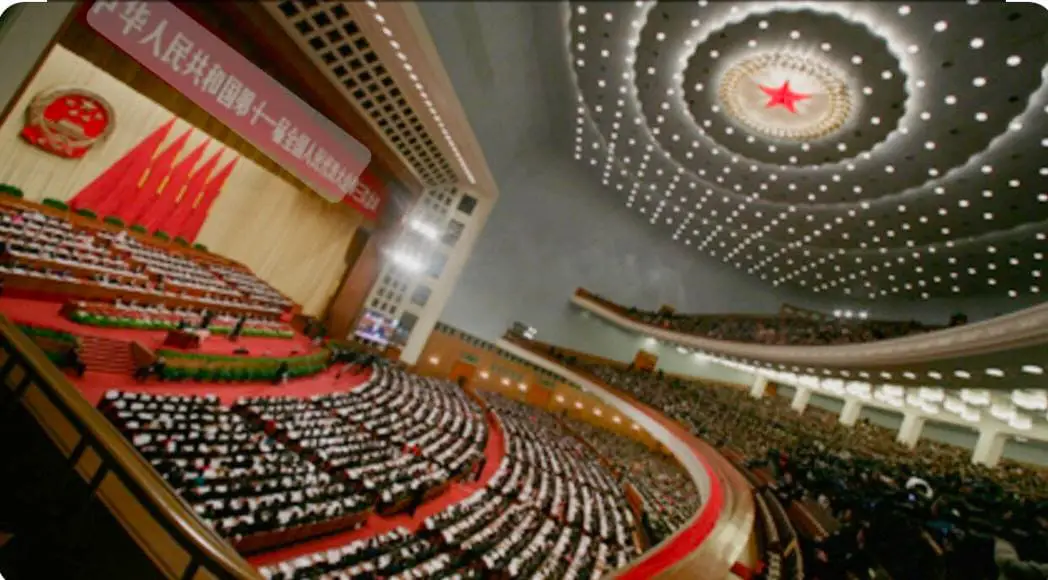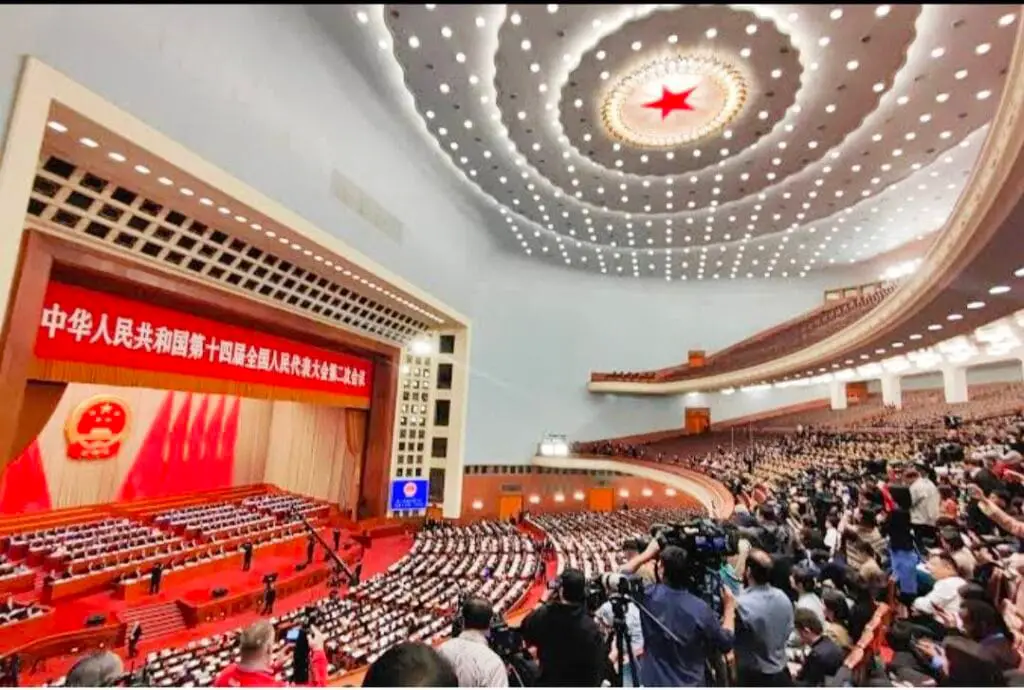
The National People’s Congress (NPC) of China is the highest state organ and legislative body in the People’s Republic of China (PRC). It holds considerable authority over legislative, supervisory, and electoral matters. While the Communist Party of China (CPC) exercises overarching control over the country, the NPC plays a significant role in formalizing laws, approving major policies, and overseeing key state functions.
Here’s a detailed discussion of the powers of the NPC :–
1. Legislative Powers
The NPC is the primary legislative body in China, with the authority to draft, amend, and approve laws. Its legislative powers are broad and cover various areas:
a) Drafting and Passing Laws
- The NPC has the power to draft, deliberate, and pass national laws. Major legislative initiatives, such as those concerning the economy, social policy, civil rights, and national defense, are discussed and voted upon by the NPC.
b) Amending the Constitution
- One of the most significant powers of the NPC is the ability to amend the Constitution of the People’s Republic of China. Any changes to the Constitution must be approved by a two-thirds majority of NPC deputies. This gives the NPC a fundamental role in shaping the country’s legal and political framework.
c) Overseeing Law Implementation
- The NPC supervises the implementation of laws and ensures that all levels of government comply with national legislation. Through its Standing Committee, the NPC oversees the practical enforcement of laws passed by the legislature.
d) Enacting Constitutional Laws
- The NPC has the power to enact constitutional laws and determine policies regarding the national legal structure. This includes legislation affecting judicial reforms, administrative changes, and civil rights.
2. Supervisory Powers
The NPC plays a key role in overseeing the operations of the government and other state bodies. Its supervisory powers ensure that the government acts according to the law and the Constitution:
a) Supervising the State Council
- The NPC has the authority to supervise the State Council, which is the highest executive body in China. The Premier, Vice Premiers, and other ministers are required to report to the NPC, which evaluates their performance and ensures that they are implementing laws and policies effectively.
b) Supervision of Judicial Bodies
- The NPC oversees the work of the Supreme People’s Court and the Supreme People’s Procuratorate. This includes reviewing their annual work reports and ensuring that the judicial system functions according to the law. The NPC also has the authority to appoint and remove judges and procurators.
c) Reviewing and Approving Major National Reports
- The NPC reviews and approves the annual work reports of key government organs, including the Premier’s Government Work Report, the national budget, and economic and social development plans.
3. Electoral and Appointment Powers
The NPC has significant electoral powers and is responsible for electing and appointing key state officials:
a) Electing the President and Vice President
- The NPC elects the President and Vice President of the People’s Republic of China. This is done through a voting process during the annual NPC session.
b) Appointing the Premier and Other Key Officials
- The NPC appoints the Premier of the State Council (China’s head of government) based on nominations made by the President. It also approves the appointments of Vice Premiers, ministers, and heads of commissions within the State Council.
c) Appointing the Heads of the Supreme Court and Procuratorate
- The NPC is responsible for electing the President of the Supreme People’s Court and the Procurator-General of the Supreme People’s Procuratorate. These appointments ensure that the judiciary and the procuratorial system are functioning under the guidance of the NPC.
d) Removing Officials from Office
- The NPC also has the authority to remove senior officials, including the President, Premier, and other key officials, through formal processes if they are found to be in violation of the law or unable to perform their duties effectively.
4. Powers to Approve Major Policies and Plans
The NPC has a key role in approving national policies, plans, and initiatives:
a) Approving the National Budget
- The NPC reviews and approves the state budget submitted by the State Council. This includes reviewing the allocation of national revenues, expenditures, and deficit management. The NPC ensures that the budget aligns with the country’s long-term goals and economic policies.
b) Approving National Development Plans
- The NPC is responsible for approving major national plans, such as five-year economic and social development plans. These plans outline China’s economic and social goals and provide the framework for government policies.
c) Approval of Treaties and Foreign Agreements
- The NPC must approve any major international agreements, treaties, or alliances entered into by China. This includes bilateral trade agreements, defense pacts, and environmental accords. The NPC plays a role in ensuring that such agreements align with national interests.
d) Deciding on Issues of War and Peace
- The NPC holds the power to decide on issues related to war and peace. Although the Central Military Commission commands the armed forces, the decision to declare war or mobilize the military for national defense purposes must be approved by the NPC.
5. Constitutional Powers and Interpretative Authority
The NPC holds important powers related to the Constitution, making it the ultimate authority on constitutional matters:
a) Constitutional Interpretation
- The NPC, through its Standing Committee, has the power to interpret the Constitution and national laws. This interpretative authority allows the NPC to clarify legal issues and ensure that laws are applied consistently throughout the country.
b) Monitoring Constitutional Compliance
- The NPC is responsible for ensuring that all state organs, including the government, military, courts, and procuratorates, operate in compliance with the Constitution of China. It can amend laws and take corrective measures if constitutional violations occur.
c) Addressing Issues in Special Administrative Regions (SARs)
- The NPC also has powers related to Hong Kong and Macao, China’s Special Administrative Regions (SARs). It can interpret the Basic Law of these regions and ensure that their governance complies with China’s national policies, especially regarding national security and sovereignty.
6. Role in Declaring States of Emergency
In cases of national crises or emergencies, the NPC has the authority to declare a state of emergency:
a) National Crises
- The NPC can declare a state of emergency in response to natural disasters, security threats, or other national crises. This power enables the NPC to authorize extraordinary measures to protect national interests and ensure public safety.
b) Suspension of Civil Liberties
- During a state of emergency, the NPC can approve measures that may temporarily limit certain civil liberties in the interest of national security, such as restrictions on movement, communication, or public assembly.

Conclusion
The National People’s Congress (NPC) holds extensive powers as the supreme legislative and supervisory body in China. Its responsibilities encompass legislation, constitutional interpretation, supervision of government operations, appointment and removal of officials, approval of major national policies, and management of national emergencies. While the Communist Party of China (CPC) dominates the political landscape, the NPC plays a crucial role in the formal legal and administrative structure of the PRC, ensuring that government functions are executed according to law and the Constitution.
